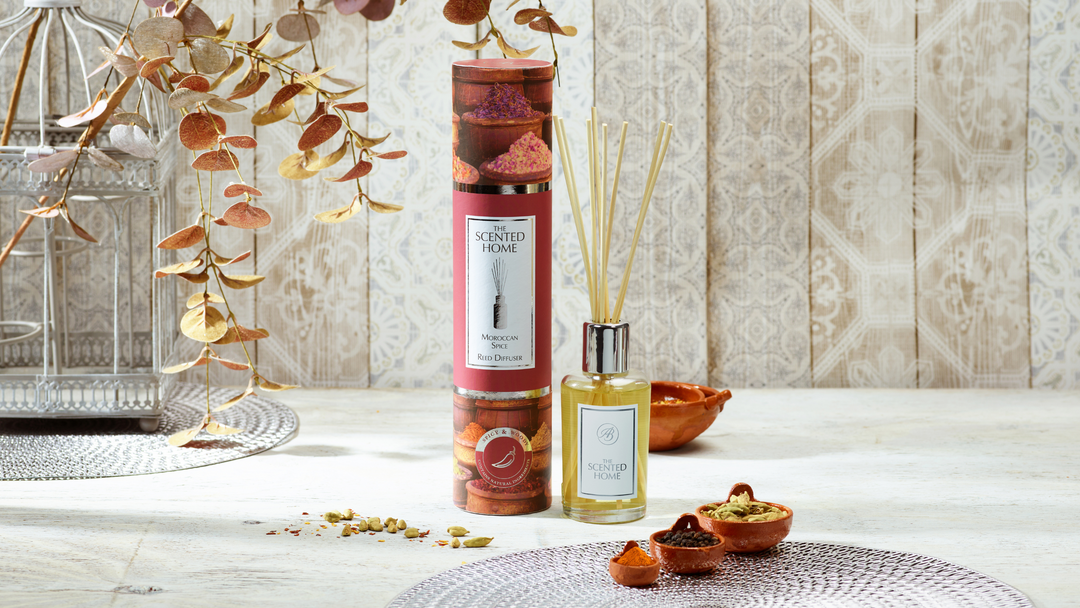Have you recently bought one of our Reed Diffusers and are looking for a step by step guide on how to use it? Discover our commonly asked Reed Diffuser questions below

Common Reed Diffuser Questions
A reed diffuser is a home fragrance product that uses a natural process to diffuse fragrance into the air. It consists of a bottle filled with fragrance oil and a set of reed sticks. The reed sticks are made of natural materials such as rattan or bamboo, and they have a porous surface that allows the fragrance oil to be absorbed. As the oil evaporates from the reeds, it diffuses into the air, creating a pleasant fragrance.
- Remove the plug from the top of the bottle
- Replace the decorative cap (if applicable)
- Insert the reeds into the fragrance through the hole.
The diffuser reeds will draw up the fragrance and begin diffusing it into the atmosphere. It may take up to 24 hours or so before you begin to smell the fragrance in the room, as the fragrance needs a bit of time to saturate the reeds on first use.
A 150ml Reed Diffuser will last up to 3 months, while a 50ml Reed Diffuser can last up to 4 weeks. This can vary based on a variety of factors, such as airflow, ambient humidity, ambient temperature and the number of reeds used.
Fragrance can drop down quickly at first as the reeds begin to soak up the fragrance. This should slow down once the reeds are saturated.
Draughts and ambient temperature can affect the behaviour of the Diffuser, draughts will carry the fragrance around your home but may also decrease the life of the Diffuser, as increased airflow can speed up absorption.
We recommend starting with 6-8 reeds in your reed diffuser. If you find the scent is too strong, remove a few sticks for a subtler strength.
In small spaces or rooms with little airflow, Reed Diffusers can be quite strong. If this is the case, reduce the number of reeds in the diffuser. This can help increase the life of your diffuser too.
To increase the scent of your Diffuser, flip the reeds over regularly. Be careful not to get the fragrance on surfaces or your skin. This may also decrease the life of the Diffuser, as increased airflow can speed up absorption.
You can control the strength of the fragrance by using more or less reeds. Using fewer reeds will slow down the diffusion rate but will reduce the power of the fragrance.
We recommend changing the reed diffuser sticks with each new bottle of fragrance. This is because the reeds can become clogged with fragrance and dust, stopping them from working efficiently.
Unfortunately, you can’t clean and reuse your reed diffuser sticks once you’ve used them. When reed diffuser sticks are used they become totally saturated with fragrance and even a good scrub with soap won’t rinse it all out. If you try and reuse old sticks with a new fragrance, the lingering fragrance in the reeds will interfere with your new scent. When refilling your diffuser, dispose of the old reeds and replace them with a new set.
Yes! All our reed diffuser vessels can be refilled again and again with a reed diffuser refill. Just wash your vessel out with soapy water before you refill and add a new set of reeds. You can stick with your favourite scent or mix and match to discover a new fragrance you love.
Compared to other home fragrancing methods, reed diffusers are extremely long lasting, which reduces the amount of waste generated when a product is used up. Reed diffusers are also refillable, further reducing waste.
We’re always looking to reduce the environment impact of our products, including our reed diffusers. Currently, our diffusers use recyclable cardboard packaging and are made with recyclable and reusable glass vessels. The majority of our diffusers also use natural, biodegradable rattan reeds as well as being made with a naturally derived ethanol, sourced from the cassava plant.
While we’ve haven’t tested our products on animals, reed diffusers are safe to use around pets so long as the provided instructions are followed. Reed diffusers should be placed on a flat, stable surface and kept out of reach of pets so that there is no risk of the diffuser being knocked over or touched.
We’re unaware of any adverse effects using reed diffusers would have during pregnancy. However, if you’re worried, we would recommend speaking with your midwife or doctor about your concerns.

